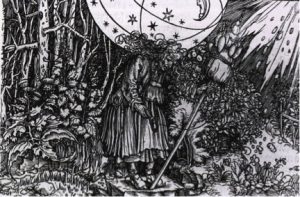Living In Wonder (At The Audacity)
Earlier this morning, I read the most recent post by John Beckett. It’s a review of Rod Dreher’s book Living in Wonder: Finding Mystery and Meaning in a Secular Age, a book he read after encountering this video by the YouTube creator, The Antibot. For those of you who hate the video format and prefer to read, the TL;DR is that Dreher is advocating for a Christian reenchantment in order to pull people who are searching for meaning (in our allegedly disenchanted world) away from “the occult.”

And well, prepare thyself! I have a lot to say, and many of my words are sharp – as subtle as an air raid, you might say.
Misplaced Blame?
To be completely transparent, I haven’t read Dreher’s book myself. Considering what I’ve read of him, his virulently racist positions, and his admiration for the autocrat, Victor Orban in the past, I don’t intend to throw any of my money his way if I can help it.
To be clear: this is not me saying that John shouldn’t have done this. If anything, I’m grateful he spent the money and time to bring us this review. The unfortunate fact of the matter is that we need at least some of us throwing money in the direction of horrible people. This is about intelligence gathering, a necessary thing if we’re going to keep up-to-date with and counter their ideology and aspirations within our communities. With older publications, often there are used copies out on the market. However, Living in Wonder has been out for less than a month, making it toss-up between dropping some coin for potentially useful intelligence or waiting for used copies to enter the market.
So, as John has already taken that particular hit for the team, I’m going to stick to quoting him on Dreher.
The first passage I wanted to discuss was the following regarding the role of the Reformation and capitalism in disenchanting the world.
In his blog, John writes:
“He says ‘it is impossible to discount the role that the Reformation played in exiling the numinous from the collective consciousness of Western Christianity.’ And unlike almost every political conservative I’ve ever read, he blames capitalism as much as Protestantism, because capitalism reduces a world infused with the divine to a thing to be monetized. His argument isn’t quite animism, but it’s certainly on the right track.”
While I don’t disagree that the Reformation played a role in “exiling the numinous from the collective consciousness of Western Christianity,” I do think we need to be careful when considering these Christianities, their views of the numinous, and any relationship to capitalism. Christianity – I would argue – contained the necessary ingredients to enable the growth of capitalism from the start.
From my perspective as an aspiring animist, capitalism is both an economic system and ideology that ultimately reduces the life of Earth and her peoples (both human and other-than-human) to exploitable resources. Terrible for the continuation of an enchanted worldview – yes. However, is that position really all that different from what we find in the Bible? Take Genesis 1:26 and Genesis 1:28 for example:
“26. Then God said, “Let us make mankind in our image, in our likeness, so that they may rule over the fish in the sea and the birds in the sky, over the livestock and all the wild animals,[a] and over all the creatures that move along the ground.”
“28. God blessed them and said to them, “Be fruitful and increase in number; fill the earth and subdue it. Rule over the fish in the sea and the birds in the sky and over every living creature that moves on the ground.”
NIV
So, in other words, humans are to dominate and subdue every other kind of person in the world by divine decree.
A final point I’d like to note before moving on: The shift to capitalism in Europe, though commonly thought to have begun with the Enclosure Acts in 16th century England, actually began a couple of centuries prior in Italy (Holler, The Birth of Capitalism, p. 55). Similar tactics, but different time and place. This is probably good to bear in mind while discussing disenchantment. Some might try to connect the birth of capitalism with the Reformation (also the 16th century) otherwise.
Reenchantment, But Make it Christian
Here is where we get to the meat of the Christian “reenchantment” Dreher would like to see.
The second quote from Dreher that stood out to me was as follows:
‘He says “there is a world outside our heads, but how we attend to it determines how real it becomes to us. And the manner of our attending is the way to become aware of the divine presence saturating the material world.”’
Although a member of the Eastern Orthodox church, what Dreher proposes here is essentially drawn from Augustinian theology. The relevance of this will hopefully become clear shortly.
“But it is the one true God who is active and operative in all those things, but always acting as God, that is, present everywhere in his totality, free from all spacial confinement, completely untrammeled, absolutely indivisible, utterly unchangeable, and filling heaven and earth with his ubiquitous power which is independent of anything in the natural order.”
Augustine, City of God Against the Pagans. Book VII, Chapter 30.
(Side note: any day that involves going through Augustine’s City of God can get in the fucking bin.)

Leveraging Reenchantment And Bad Metaphysics
For Dreher, this becoming “aware of the divine presence saturating the material world” constitutes reenchantment. Well, I disagree. Instead, I would argue that this is no true reenchantment, but simply a way of reconquering the world outside of church walls.
Why do I say this?
Consider the following passages from Dreher as quoted by John. It’s clear his primary concern is winning what he sees as the spiritual war between his god and all else. His version of reenchantment – such as it is – is simply the tool he hopes to leverage in that fight.
‘The critical problem with this book is summarized in this quote: “people today aren’t wrong to seek enchantment – but if they do it outside a clearly and uniquely Christian path, they will inevitably be drawn into the demonic.”
‘The danger of that line of thinking is shown here: “as the old Christian faith framework breaks down, more and more Americans … are opening themselves to dark enchantment, a real phenomenon, one that kills the soul. In the spiritual warfare raging around us, both visibly and invisibly, there is no neutral ground. You must take a side and commit.”’
For the lovely Mr Beckett, Dreher’s labeling of the non-Christian as “demonic” is “bad metaphysics.” I, however, would argue that there is no single, correct metaphysics, and that Dreher’s positions are entirely consistent with the metaphysics of his own religion. Moreover, I think it’s important that we recognize that no amount of well-constructed arguments from religious scholars and anthropologists will change the views of zealots like Dreher. And that even when they appear to consider our arguments, such consideration is almost always strategic. Their end goal always remains the same: conversion – their fucking religious war.

Pagans And The Demonic
Returning more directly to those metaphysics now, the tradition of labeling the non-Christian “demonic” goes back to the earliest days of the church. As far as early Roman Christians were concerned, the Paganism of the time was grounded in necromancy and magical arts, and the Roman deities nothing but (evil) demons pretending to be gods (Kieckhefer, Magic in the Middle Ages. pp 36-37).
Now, we can argue until we’re blue in the face that our Gods aren’t demons. But this narrative is over 1500 years old; it’s pervasive and well rooted. In all likelihood, we’re just wasting our breath.
As an aspiring animist, part of my “reenchantment process” has been to shift my worldview to one with an expanded conception of personhood. So, instead of limiting personhood to humans, I try to understand myself as inhabiting a world full of people, only some of whom happen to be human. As people have agency, are capable of communication, and exist in relationship with other people, I try to bring this approach to my magic as well.
For me (or at least the worldview I’m working on inhabiting), plants and trees (just to give you an example) are a kind of people with their own abilities, needs, relationships, and forms of communication. Modern science has made some of these ideas less controversial. For example, we now have evidence that trees live in communities and communicate with each other via mycorrhizal networks. This understanding is an aspect of reenchantment for me. The existence of scientific evidence for something does not remove the possibility of enchantment, and what is greater and more wondrous than that realization of personhood and interconnectedness – more people to get to know and learn from? After centuries of materialism and resources, such discoveries are reminders of the holiness and magic of our world.
However, that view would have been completely anathema to some early Christians. For example, the 2nd century writer, Tatian, saw herbs (along with amulets and other magical objects) as being a way for practitioners to “signal” to demons. Like a BeelzeBat signal, I guess. According to him, herbs had no powers of their own. Any benefits or results gained from working with them were simply the work of demons all along. Others, like Tertullian, argued instead that the herbs themselves contained magical powers, the knowledge of which was taught to women by demons (Kieckhefer. Magic. pp. 38 – 39).

Magic became the battleground upon which the war between Christianity and Paganism was fought. However, as Christianity’s hold on Europe grew stronger then eventually dominated, the combatants on the field shifted. Around the 13th century, the fight over magic became focused on the question of whether a form of magic could be considered “natural” or “demonic” (Kieckhefer. Magic. p. 12).
It was also around this period that the (papal) inquisition arrived on the scene
The Real Disenchantment?
Over the past year or so, I’ve seen two advocates for a Christian “reenchantment.” Both, I would argue, have “radical traditionalist” tendencies, one far more overtly than the other. (“Christianity is YOUR ancestral religion.”) And both ignore or downplay the centuries of church authorities working to root out actually enchanted worldviews under the guise of excising “demons” and heretics from among the faithful.
The first papal inquisitors were appointed by Pope Gregory IX in the early thirteenth century. They were to seek out heretics – a task initially left to bishops. According to one inquisitorial guide of the era, they were to question their suspects about everything from divination and invocation of demons to singing charms over herbs and using baptismal water in magic.
And unsurprisingly, it wasn’t long before they encountered reports of sorcery. However, this was before they got slick with the accusation game. In one case, a woman managed to escape prosecution by arguing that she hadn’t committed heresy. Her reason? She hadn’t actually believed in the magic she was selling. She’d found the loophole. Eventually, Pope Alexander IV directed his inquisitors to only prosecute magic that “savored of heresy.”
As you might expect, this prompted some inquisitors to develop arguments that all magic was heretical. Yes, they were bringing back that old conversion period line that magic was all about the demons. One area where this was particularly clear were the arguments concerning necromancy forwarded by inquisitors and theologians like Nicholas Eymericus. According to Eymericus and his peers, necromancy was inherently heretical because it involved the belief that “demons” were worthy of veneration. Another thing they argued for was the existence of “practical heresy,” or in other words: a form of heresy that was also implicit in one’s actions regardless of belief.
And this was basically how a bunch of (probably sexually frustrated) theobros convinced Pope John XXII to direct the inquisition to target necromancers and magicians directly (Kieckhefer. Magic. pp. 190-191).
Lovely.
Yet again, the battleground that was magic had become a fight against “demons.” The shitty old arguments were returning; nature wasn’t healing. Inquisitors were coming for everything from the benign charms spoken over herbs for healing to the foulest necromancy, and pretty much everything in-between that could be considered evidence of deviation from dogma. In one place, inquisitors even accused a physician of having a book of “necromancy,” when really it was a book of herbal remedies (Kieckhefer. Magic. p. 192).
By the 15th century, judges and prosecutors in mainland Europe began to forward narratives of anti-Christian conspiracies featuring magicians and witches in league with demons and/or the Devil. It was also in this period that the demonic pact narrative rose to prominence as well (Kieckhefer. Magic. pp. 194-197).
But was any of this truly a disenchantment of the world?
I would argue that it was. The world before the spread and rise of Christianity was a busy one. One inhabited by all manner of peoples both living and dead. Gods, the beings we now refer to as “Otherworldly,” the unseen peoples of our Holy Middle Earth—all became “devils” or “demons” under the new order. Their very existence was/is a challenge to the notion of a world made, maintained, and wholly directed by a single god found.
We can see the rise of the papal inquisition and the witch trials as a campaign against the daemonic, spirit-filled world. A way of making such beliefs fearful to the masses, that fear enforced by spectacles of horrific public torture and execution.
(And that’s not even getting into the fact that the church actively campaigned to limit the dreams of adherents out of fear of them encountering the Dead, Deities, and Otherworldly. Because, yes, that happened!)
The Actual State Of Play
When I read the words of people like Rod Dreher, I hear in them a call to resurrect an old, bloody, and frankly evil story. True reenchantment is an expansion of our world, an act of restoration, and a recognition of our place in that wider web of relationships and life. What he advocates, however, is a return to that same old worldview that has caused so much harm and ultimately left so many feeling disconnected and an emptiness within.
(Total utopia they’re selling here, lads!)
In my opinion, the enchantment that survived did so despite the efforts of Dreher’s religious forebears. I believe we forget that at our peril, especially in our current era.
This isn’t the end of it, just one of the opening (?) volleys we just happened to catch. Dreher likely isn’t the only one working this angle, and nor will it be the only strategy he and his fellow-travelers try to employ. We need to guard against well-used tactics such as content produced to manufacture an illusion of consensus or create a foundation to co-opt elements of our practices with allegedly Christian symbolism. We need to also consider the possibility of entryist tactics within our communities.
Last but not least, Dreher is a friend of JD Vance, our Vice-President elect. We face an incoming administration that has been shaped by Christian nationalist ambitions. Needless to say, we need to tread carefully. Dreher is not alone in believing he’s fighting a spiritual war. Posts and comments about spiritual warfare and the battle of good over evil have become worryingly common online over the past few months, and especially before the election. For some, the past election was the great showdown between Christianity and evil, with Michael the Archangel one of the main recipients of their prayers.

The rules we’ve been playing by for the past few decades are likely to go the way of the dodo.
We need to recognize the fight we’re in and be smart about it. Frankly, I don’t even think we have the luxury of believing in common ground anymore. We in the US are, at least theoretically, a nation of laws. We’re supposed to have the freedom of religion, to believe whatever the fuck we want. That is where we must direct our fight. And failing that?
Well, that’s the question, isn’t it?








 ourselves being mobbed by mosquitoes.
ourselves being mobbed by mosquitoes.



